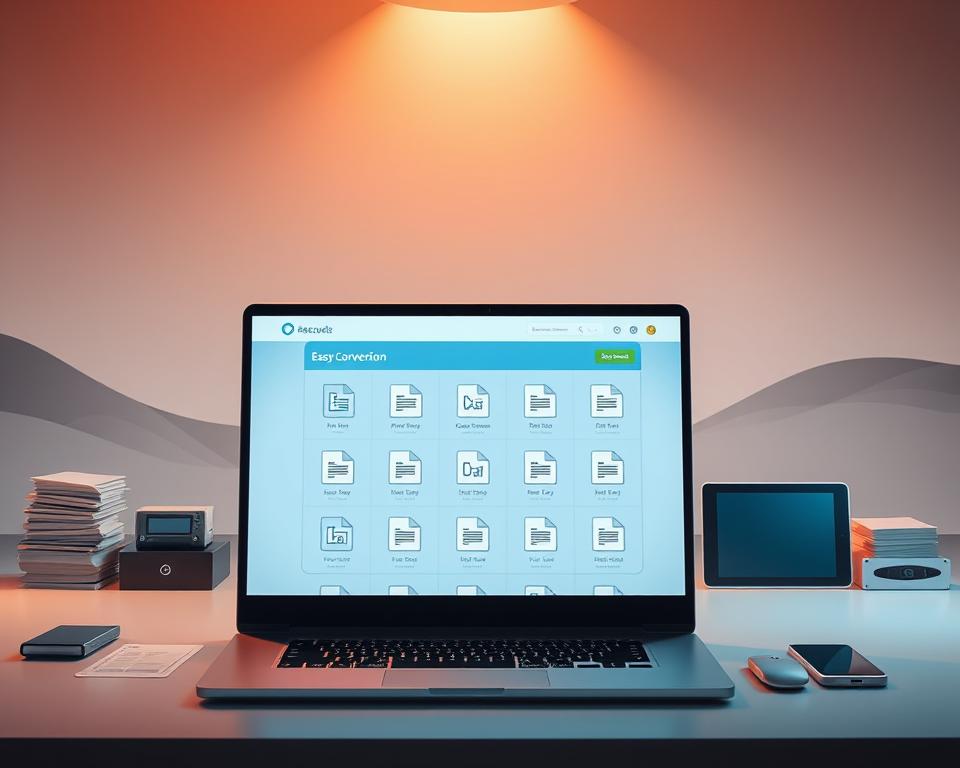Advertising
Did you know that over 60% of users of online file converters Aren't you aware of security risks? Reliance on digital services increases the importance of using online tools safely. In this article, we'll show you how to make efficient conversions while protecting your privacy and data.
Let's explore best practices for a safe and reliable conversion experience.
Advertising
Main Conclusions
- THE file conversion security is essential to protect sensitive data.
- Choosing the right converter can improve your user experience and safety.
- There are online tools that offer robust protection during conversion.
- Using VPNs and proxies can increase privacy during the process.
- Checking a tool's reputation is essential before using it.
Introduction to Online File Conversion
Online file conversion is a practical solution. It allows you to convert various file formats, such as PDF, JPG, and DOC. With a online file converter, you can easily change the extension of documents. This gives you more flexibility when using different file types.
This process is widely used in everyday life and can be used for both personal and professional purposes.
The main benefits are convenience and speed. You can convert documents from anywhere, without needing to install complex programs. Many tools are easy to use, making conversion safe.
However, it's important to be aware of security risks. To protect your data, be alert to these issues.
Why is Security Important in File Conversion?
THE file conversion security is crucial in a digital world. Data is more vulnerable than ever. Online tools can expose your files to the risk of breach.
Sensitive information, such as financial documents, can be accessed inappropriately. This happens if adequate security measures are not in place. Therefore, protecting this data is vital.
Security breaches can cause significant losses. It's important to know how to identify insecure tools. Check whether the platform uses encryption to protect your files.
Look for reviews from other users about the service's reliability. Security should be your priority when working with files online.

How to Use Online Tools to Convert Files Safely
Choosing the right tool to convert files is crucial. You should consider the platform's encryption, privacy policy, and reputation. Choose a service that prioritizes the security of your files and personal data.
Choosing the Right Tool
Look for a platform with a good security track record. Check other user reviews. They can provide important insights into the tool's reliability.
Key Security Features
The best tools offer malware protection and secure storage. This protects your files during conversion. Encryption when sending and receiving files is essential to keeping your information safe.
Best Online File Converters
Choose one online file converter It can be difficult. There are many options available. It's crucial to analyze the features of each tool. Consider which formats are supported and the specifics of each platform.
The best converters should meet your needs. They should also be safe and easy to use.
Feature Comparison
The best converters offer multiple features. They allow you to convert between various formats, such as PDF, DOC, and JPG. Some also offer file editing, compression, or merging.
Comparing these tools helps you find the best one for you, so you can better adapt it to your work.
Reputation and User Reviews
Reputation is very important when choosing a online file converter. Checking other users' reviews is essential. Well-reviewed platforms generally have fast support and resolve issues quickly.
Choosing a well-reviewed converter ensures a positive experience. It also protects your files during conversion.

File Protection During Conversion
Protect files during conversion is very important. This helps prevent data leaks and unauthorized access. To convert files safely, it is essential to disable automatic sharing.
Check the security settings of your chosen tool. Many offer file encryption and automatic deletion. These measures protect your data, reducing the risk of unauthorized access.
Follow these guidelines to protect your documents. This way, you can convert files safely. Digital security is crucial to preserving the privacy of your data.
Tips for Ensuring Privacy When Converting Files
When using online file conversion services, privacy is essential. There are ways to protect your data during conversion. This way, you can get on with your tasks without worrying about sensitive information.
Using VPNs and Proxies
Using VPNs and proxies is a great way to protect your dataThey hide your IP address, making it difficult to know where you are on the internet. They also encrypt your connection, adding more security. This is crucial for maintaining your privacy when converting files.
Before choosing a conversion tool, check its privacy policies. It's best to choose services that don't store your files after conversion. This helps maintain a balance between functionality and security. protect files during conversion.
How to Protect Files During Conversion
Protecting files during conversion is essential for data security. Secure conversion tools use encryption to protect your information. This ensures your data remains secure during transfer.
It's also important to review service contracts. This helps protect your rights to your files. By reading privacy policies and terms of use, you protect yourself against leaks or misuse.
Conclusion
When using online tools to convert files, security should always be a priority. Converting files can reveal sensitive information. Therefore, it's crucial to choose secure tools to protect your privacy.
Understanding the different tools available helps you make better decisions. Analyzing the tools' features and reviews is essential. This helps you find the safest and most effective ones. Additionally, following privacy protection tips is crucial during conversion.
In short, adopting best practices improves security and efficiency when converting files. Always be vigilant and make informed choices. This will ensure safer experiences when using online services.
